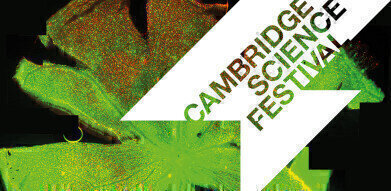-
 Image credit: Dr Andrew Osborne, Cambridge Centre for Brain Repair, University of Cambridge
Image credit: Dr Andrew Osborne, Cambridge Centre for Brain Repair, University of Cambridge
News
How Science is Changing our World: Cambridge Festival 2020
Feb 04 2020
Examining the past to reach a vision for the future is the central theme of the 26th Cambridge Science Festival which will explore topics such as predictive policing, mini organs, growing food underground, global mega-fires and the limits of human endurance. Run by the University of Cambridge, the 2020 Festival is set to host 390 events between 9 – 22 March at venues across the city. Climate features heavily as do health and new technological advances alongside fun science quiz events, comedy and theatre.
As ever, there are a range of talks and debates that reveal how scientists are working to understand and solve some of the greatest challenges of our time. Speakers include Professor Dame Athene Donald; Professor Dame Sally Davies, former Chief Medical Officer; BBC presenter Dr Adam Rutherford; Lord Martin Rees; Baroness Bryony Worthington; Dr Emily Shuckburgh; Professor Sir Partha Dasgupta; and neuroscientist Professor Barbara Sahakian.
The weekends of the Festival sees hundreds of events for families, including talks on the fastest animals on earth; weird, mind-fizzingly awesome and funny science facts; hands-on demonstrations with Microsoft HoloLens; robotic workshops; and a virtual reality cycle ride. Festival favourite, Dr Peter Wothers returns for another loud, action-packed talk showcasing the elements involved over the centuries in mankind’s quest to light his way. Further events explore what animals see, the science of snot and magical maths tricks. British Antarctic Survey, Institute of Astronomy, Wellcome Genome Campus, Cavendish Laboratory and various museums and University Departments open their doors to the public. Visitors can discover what it takes to be a Polar explorer, study the skies through telescopes, see developments in medical implants, discover why robots are not going to take over the world, immerse themselves in Virtual Reality and much more. On Saturday evening, the Centre for Computing History hosts the Family Gaming Night. With games from retro classics like Pac-Man and Space Invaders through to modern examples like Wii, PS3, Xbox 360 and Xbox One.
The second week kicks off with a talk about CRISPR technology and the future of genome editing (16 March) while the final day of the Festival focuses on health from the history of HIV, to stem cells, infectious diseases, cancer and new therapies. There are also brain training games, a pop-up escape room and some messy play with the colourful world of bugs, germs, bacteria, viruses, parasites and fungal infections.
In addition to the hundreds of talks and debates, the Festival hosts a range of exhibitions, performances and tours. Speaking ahead of the Cambridge Science Festival, Dr Lucinda Spokes, Festival Manager, said: “The programme this year is focussed on ‘vision’: where we were, where we are and where we hope to be. Science offers huge possibilities to change the course of our planet for the better. With this year’s programme, we hope to inspire and excite our visitors about these possibilities.”
“As ever, we have endeavoured to tackle some of our greatest challenges through a range of events including talks, debates, performances, comedy, film, tours and exhibitions. We look forward to welcoming and actively engaging with our audiences in March, hearing their views and thoughts about current and future scientific research.”
Bookings open from Feb 10. Details and full programme available here.
Digital Edition
Lab Asia Dec 2025
December 2025
Chromatography Articles- Cutting-edge sample preparation tools help laboratories to stay ahead of the curveMass Spectrometry & Spectroscopy Articles- Unlocking the complexity of metabolomics: Pushi...
View all digital editions
Events
Jan 21 2026 Tokyo, Japan
Jan 28 2026 Tokyo, Japan
Jan 29 2026 New Delhi, India
Feb 07 2026 Boston, MA, USA
Asia Pharma Expo/Asia Lab Expo
Feb 12 2026 Dhaka, Bangladesh


















